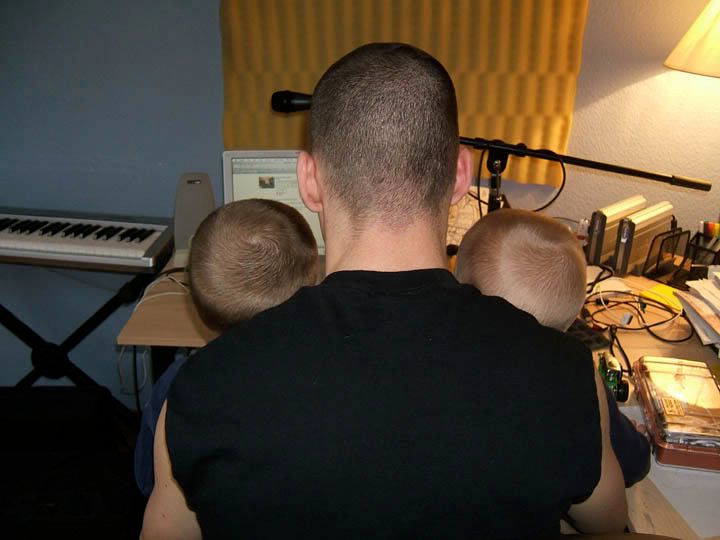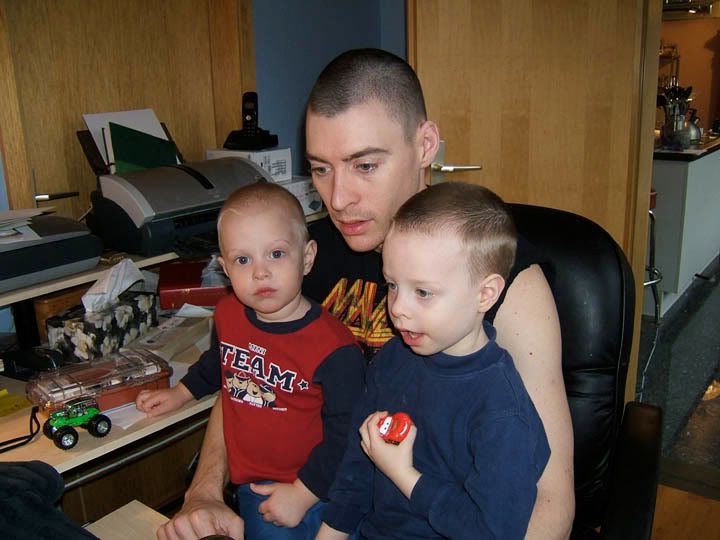For those of you uninterested in the following topic, I've scattered adorable unrelated pictures of the boys throughout. Feel free to just scroll through to view, and then go forward with your day. Otherwise, come back tomorrow for a more knit related post
-----------------------------------------------------------------------
First, a disclaimer:
All of the following is my opinion, and should be taken as such. If you choose to do differently, please feel free to do so -- the point of this post is to encourage you to think for yourself. I am very strongly opinionated, but that doesn't mean that I think your birth choices, should they be different than mine, are wrong. The most important thing to me is that you feel and are safe, healthy, and in control of your pregnancy and delivery. I don't want to make anyone upset or angry. I just want to get you thinking.
Also, please be aware that I have experienced both the medical side of things (as I have had a doctor for this entire pregnancy up until about a month ago when I found my midwife), and the "community homestyle" or "natural" side of things.
Second, a clarification:
There are many kinds of doctors, and several types of midwives. Some Obstetricians (OB's) have been specifically trained to deal with nutrition and preventative health. Most, however, have not. In this post I deal with the issue of the latter.
Midwives in the states come (as far as I know) in two flavors: Certified Nurse Midwives and the "illegal" Uncertified Folk Midwife (my own title for them). The certified tend to act as a cross between a doctor and a nurse, working under direct supervision of a doctor. They are allowed to prescribe medicine, do prenatal care, and deliver a baby, but they cannot do c-sections. Folk Midwives, on the other hand, operate illegally in their communities, using knowledge that they have not only gained through study, but through intense, hands on apprenticeship through another established Folk Midwife. These midwives also almost always assist you in delivering your baby in your own home. In this blog, when I say "midwife", let's assume that I'm talking about the Folk Midwife, and home delivery.
Thirdly, a request:
Please leave any questions or concerns you may have in the comments, and I will follow up with answers (or, in the least, clarifications) in the next post, so that we can all be involved in the conversation.
-----------------------------------------------------------------------
Many people have asked me at different times why I make seemingly ancient and/or "hippie" choices about pregnancy and birth. With all of the technology available to us -- and it's free for me, because of my husband's job and our medical coverage -- why not take full advantage of the benefits medical science has brought us?
Those are good points, so I'm going to share with you my pregnancy and birth philosophy, and then perhaps you'll understand.
I am not a patient. When a woman becomes pregnant, she is immediately treated as a sick person. Have you ever heard the phrase "in her condition", when referring to a pregnant woman? This, apparently, is a condition that needs careful monitoring by the medical system, and likely intervention to free her from her state.
In the first visit to the doctor, I was informed that I would need to take a class on all of the tests they would like to perform on me and my baby, mostly having to do with invasive procedures to discover if my baby had any abnormalities such as Downs Syndrome (my question: What am I expected to do if the baby does? also: Do you realize that none of these tests are 100% accurate, and that you can easily test a false-positive?).
Several visits later, the doctor started to set me up for a routine ultrasound. When I declined, he was shocked. As it turns out, I am the first person in his 20 years of practice who has ever turned down an ultrasound.
Now, viewing the baby inside has it's place. If there is something suspected to be dangerously wrong (like Placenta Praevia, or similar), you would definitely want to verify this (although a skilled midwife or doctor generally tells this by listening with the SonicAid or fetal stethoscope for the location of the placenta). I am all about medical inspection and intervention if it happens to be needed. Also, if you wish to know the gender of your baby before it's born, that would be another good reason.
However, using ultrasound just to check the position of the baby, size, gestational age, are all unnecessary. A skilled OB or midwife should be able to verify all of these things with no trouble through prodding the mother's belly. Exposing the baby to ultrasound waves for these purposes alone is completely needless.
 My midwife prescribed this tea for me to drink in the last few weeks, along with crushed linseed, which I eat in yogurt. It's not actually as bad as it looks, but I don't think I'll be craving this after the baby's born. =)
My midwife prescribed this tea for me to drink in the last few weeks, along with crushed linseed, which I eat in yogurt. It's not actually as bad as it looks, but I don't think I'll be craving this after the baby's born. =)I believe in preventative health. In medical school, OB's-to-be are usually trained to think in terms of "fixing things". There are so many nutritional ways of increasing health and preventing different complications, that I find this surprising, and more than a little bit disconcerting.
I choose to entrust my life and the life of my new little person to proven rather than just certified hands. Upon completion of their training (which includes some hands on experience), doctors receive a certification, and are released to work with the paying public. If the OB tends to have a terrible bedside manner, or a high rate of complications or deaths for patients in their care, it doesn't necessarily affect their certification status. It's also difficult to discover these stats, since those things don't qualify or disqualify him/her from his/her job. Doctors tend to be trusted for their medical opinion, because they have been certified.
Throughout the ages, folk midwives have depended on apprenticeship training, passing down their knowledge from older to younger, learning through doing, as well as research and study. The new (and generally younger) midwife proves her skill in the community while working with her mentor. She becomes known for her skill (or lack of), and her reputation follows her. If she's good, she'll get work. If not, she'll have to find a different profession.
I would rather have prenatal supervision than prenatal care. It may not seem like there would be a huge distinction, but to me it goes back to the whole "I am not a patient" thing. An OB will usually consider the woman who comes to them for prenatal check-ups to be under his or her care. A midwife considers the woman to be in control of her nutrition, health, and overall well-being, coming to the midwife for the purposes of guidance and knowledgeable friendship.

It is important to me that the person who sees me prenatally will be there for my labor and delivery. When a woman in labor is admitted into a hospital, she is attended by the staff of nurses until she is ready to literally push the baby out. She is usually hooked up to all manner of devices to assist the staff in caring for her, since it's usually impossible for a nurse to stay with her physically the entire time. The woman is given internal checks to determine the status of cervical dilation. It is then that the doctor is called in (hopefully the one that has been seeing her for prenatals the whole time is actually on call at the time!), delivers the baby, and hands the little person over to the pediatric specialists. Then that's it. Their job is to see her through her pregnancy, develop a relationship with her, then literally deliver her baby.
When the laboring woman calls a midwife, the midwife goes to the woman's house. She stays with the woman throughout her labor, assisting and advising as needed, suggesting different laboring positions that might speed things up or slow things down as things progress. She has built a friendship with the woman through the prenatal visits, and has earned her trust and respect. The husband, if he is at home and willing, is called upon to help make decisions if need be.
The husband and the midwife work as a team to assist the mother in delivering the baby in the most peaceful, graceful way possible, with minimal interference. The woman is not hooked up to any monitors, because there is no need -- her birthing team (husband, midwife, and whoever else has been chosen to be there), stays with her the entire time, monitoring her progress personally.
Internals are needless in this situation; they are only given if the woman wants to know how far along she is. (Even so, you never know when you might get temporarily "stuck" at a certain point of dilation for an hour or so, or if you're just about to suddenly open up all the way -- there's no way of knowing, so I don't find the information helpful. On top of that, it is less than comfortable on a good day -- way worse when you're actually in labor, and who needs that stress?)

One intervention leads to another. Many of my friends have been induced to start labor. As a woman nears her due date, Doctors will often reassure them that the doctor won't "let" them go more than 2 days past their due date, although it is perfectly safe to go two weeks overdue. "If you don't go into labor by Sunday, come in at xx:xx am, and we'll induce you." (At this point, I often wonder if the doctor truly thinks that the baby will stay in there forever without their help. Has this ever happened?) When a woman is induced, she is given an intravenous drip of pitocin which causes artificial contractions.
While a natural contraction has an arc of intensity -- beginning, middle and end -- the artificial one only gives you the peak sensation, with no build-up. It is very possible to endure and even work with natural contractions through methods such as total body relaxation (like the technique taught at the end of a Yoga session) and acupressure.
When on a pitocin drip, it is often physically impossible to imagine enduring even a few of these with no help, so medication is often the only option. These medications may or may not even have the desired effect on the woman, and it can even vary from one labor to the next with the same person.
One of my friends had an effective epidural with her first baby, but when she asked for the same method with her second, it worked until she was 7 centimeters dilated, and then suddenly quit at the height of her pain. Another friend had something to take the edge off of her contractions (I think it was Demerol, but I'm not sure), and she just had the feeling that, while her pain persisted, she felt completely helpless and miles away from her husband, who was standing right there next to her.
Besides the fact that the pain medication may not work as expected, it can also cause complications. While the pitocin is slamming the baby's head down, over and over in a mechanical style, the pain medication can actually slow labor down at the same time, since the woman can no longer actively work with the contractions. In the end, forceps might be needed to get the baby out (often because they're so jammed in the wrong way because they could not naturally flex their head and make their way down), vacuum suction, or even emergency c-section.
I cannot count the number of times I've heard an awful birth story end with "if the doctor hadn't been there, I would have died". What I want to say (although I don't), is "if you hadn't allowed the doctor to interfere, your life wouldn't have been endangered in the first place."
Also, there has been a huge increase in recent years of planned c-sections. Sometimes there is a good reason for it, such as when a baby is presenting breech. Although it is still possible to give birth naturally in this case, it can actually be life threatening for the woman and the baby. When women choose it for convenience sake, however, I often wonder if they realize that they're choosing to risk their life through major surgery. That the surgeon will need to slice through 7 layers of the woman's person, and then go back through and sew them all back up. That the recovery time is terribly painful; everything is a challenge, from lying down to sitting to standing, since it's the stomach muscles that have been affected.
If, for whatever reason, a woman chooses to be induced or plans a c-section, I do not hold it against her or think less of her in anyway. I do, however, hope that she realizes that she has a choice and realizes her risks and options. It is also important to realize and that the doctor may or may not want to respect her opinion. I also hope that the woman realizes that she has the right to disagree and go against medical advice (AMA) if something doesn't seem right or necessary.

I choose to be fully involved in my labor and delivery. I've made a decision not to use pain killers during my labor. This is not because I want to prove something or show that I can "handle it" better than the next person. It is simply that labor is a rather intense thing, and I would be very nervous if I couldn't tell what was going on. I'm not a sucker for pain, and that's why I use Acupressure (booklet available for free PDF download here), which helps to manage it greatly. I like to be able to make the conscious decision to relax my entire body, Yoga style, even while the most intense contractions imaginable grip my body. I feel powerful being able to work with my body, feeling the strength of the uterine muscles doing their job. I am able to walk around, sit on a birthing ball, lie down on a bed, focus in a rocking chair. I am free to move around, not trapped by pain medications that slow down my mental state, and impair me physically.
Most importantly, perhaps, is the fact that once I do give birth to the baby, I am able to experience and enjoy 100% the joy and the elation of holding that brand new person for the first time. I will be able to feel the giddy excitement and adrenaline rush that can only come after such an intense physical feat.
Babies naturally have about an hour of alert time immediately after birth, to learn how to eat, and connect with their moms. I can be alert and connect with my baby during that first hour, after which I, too, will fall into a wonderful, deep sleep.
When the mother has received pain medication during her labor, it not only affects her, but also the baby (a tiny bit of it goes into his or her system, often making him/her sluggish). This, obviously, can get in the way of the whole After Birth Experience.
I do not look forward to the intensity and pain of the upcoming birth. However, I do know that I will, once again, come out on the other side of it amazed at the strength of my body, the endurance that I am capable of, and the gorgeous baby that I will be able to enjoy.

I want to know that I have made my own, informed choices. The most important thing to me is that each woman knows the choices available to her. That she realizes how her choices will affect the baby, and that she is able to relax in the knowledge that she is having the very best birth experience possible. Whatever that means to her, whether it be giving birth in a hospital, a childbirth center, at home, taking advantage of technology and medication or not, it is paramount that she is confident and at peace.
My hope is that no one feels bad about making choices that may differ from mine, but instead that you make your own informed decisions on each thing surrounding your birth.
Please leave any thoughts and questions in the comments so that I can respond to them in the next post.
I choose to entrust my life and the life of my new little person to proven rather than just certified hands. Upon completion of their training (which includes some hands on experience), doctors receive a certification, and are released to work with the paying public. If the OB tends to have a terrible bedside manner, or a high rate of complications or deaths for patients in their care, it doesn't necessarily affect their certification status. It's also difficult to discover these stats, since those things don't qualify or disqualify him/her from his/her job. Doctors tend to be trusted for their medical opinion, because they have been certified.
Throughout the ages, folk midwives have depended on apprenticeship training, passing down their knowledge from older to younger, learning through doing, as well as research and study. The new (and generally younger) midwife proves her skill in the community while working with her mentor. She becomes known for her skill (or lack of), and her reputation follows her. If she's good, she'll get work. If not, she'll have to find a different profession.
I would rather have prenatal supervision than prenatal care. It may not seem like there would be a huge distinction, but to me it goes back to the whole "I am not a patient" thing. An OB will usually consider the woman who comes to them for prenatal check-ups to be under his or her care. A midwife considers the woman to be in control of her nutrition, health, and overall well-being, coming to the midwife for the purposes of guidance and knowledgeable friendship.

It is important to me that the person who sees me prenatally will be there for my labor and delivery. When a woman in labor is admitted into a hospital, she is attended by the staff of nurses until she is ready to literally push the baby out. She is usually hooked up to all manner of devices to assist the staff in caring for her, since it's usually impossible for a nurse to stay with her physically the entire time. The woman is given internal checks to determine the status of cervical dilation. It is then that the doctor is called in (hopefully the one that has been seeing her for prenatals the whole time is actually on call at the time!), delivers the baby, and hands the little person over to the pediatric specialists. Then that's it. Their job is to see her through her pregnancy, develop a relationship with her, then literally deliver her baby.
When the laboring woman calls a midwife, the midwife goes to the woman's house. She stays with the woman throughout her labor, assisting and advising as needed, suggesting different laboring positions that might speed things up or slow things down as things progress. She has built a friendship with the woman through the prenatal visits, and has earned her trust and respect. The husband, if he is at home and willing, is called upon to help make decisions if need be.
The husband and the midwife work as a team to assist the mother in delivering the baby in the most peaceful, graceful way possible, with minimal interference. The woman is not hooked up to any monitors, because there is no need -- her birthing team (husband, midwife, and whoever else has been chosen to be there), stays with her the entire time, monitoring her progress personally.
Internals are needless in this situation; they are only given if the woman wants to know how far along she is. (Even so, you never know when you might get temporarily "stuck" at a certain point of dilation for an hour or so, or if you're just about to suddenly open up all the way -- there's no way of knowing, so I don't find the information helpful. On top of that, it is less than comfortable on a good day -- way worse when you're actually in labor, and who needs that stress?)

One intervention leads to another. Many of my friends have been induced to start labor. As a woman nears her due date, Doctors will often reassure them that the doctor won't "let" them go more than 2 days past their due date, although it is perfectly safe to go two weeks overdue. "If you don't go into labor by Sunday, come in at xx:xx am, and we'll induce you." (At this point, I often wonder if the doctor truly thinks that the baby will stay in there forever without their help. Has this ever happened?) When a woman is induced, she is given an intravenous drip of pitocin which causes artificial contractions.
While a natural contraction has an arc of intensity -- beginning, middle and end -- the artificial one only gives you the peak sensation, with no build-up. It is very possible to endure and even work with natural contractions through methods such as total body relaxation (like the technique taught at the end of a Yoga session) and acupressure.
When on a pitocin drip, it is often physically impossible to imagine enduring even a few of these with no help, so medication is often the only option. These medications may or may not even have the desired effect on the woman, and it can even vary from one labor to the next with the same person.
One of my friends had an effective epidural with her first baby, but when she asked for the same method with her second, it worked until she was 7 centimeters dilated, and then suddenly quit at the height of her pain. Another friend had something to take the edge off of her contractions (I think it was Demerol, but I'm not sure), and she just had the feeling that, while her pain persisted, she felt completely helpless and miles away from her husband, who was standing right there next to her.
Besides the fact that the pain medication may not work as expected, it can also cause complications. While the pitocin is slamming the baby's head down, over and over in a mechanical style, the pain medication can actually slow labor down at the same time, since the woman can no longer actively work with the contractions. In the end, forceps might be needed to get the baby out (often because they're so jammed in the wrong way because they could not naturally flex their head and make their way down), vacuum suction, or even emergency c-section.
I cannot count the number of times I've heard an awful birth story end with "if the doctor hadn't been there, I would have died". What I want to say (although I don't), is "if you hadn't allowed the doctor to interfere, your life wouldn't have been endangered in the first place."
Also, there has been a huge increase in recent years of planned c-sections. Sometimes there is a good reason for it, such as when a baby is presenting breech. Although it is still possible to give birth naturally in this case, it can actually be life threatening for the woman and the baby. When women choose it for convenience sake, however, I often wonder if they realize that they're choosing to risk their life through major surgery. That the surgeon will need to slice through 7 layers of the woman's person, and then go back through and sew them all back up. That the recovery time is terribly painful; everything is a challenge, from lying down to sitting to standing, since it's the stomach muscles that have been affected.
If, for whatever reason, a woman chooses to be induced or plans a c-section, I do not hold it against her or think less of her in anyway. I do, however, hope that she realizes that she has a choice and realizes her risks and options. It is also important to realize and that the doctor may or may not want to respect her opinion. I also hope that the woman realizes that she has the right to disagree and go against medical advice (AMA) if something doesn't seem right or necessary.

I choose to be fully involved in my labor and delivery. I've made a decision not to use pain killers during my labor. This is not because I want to prove something or show that I can "handle it" better than the next person. It is simply that labor is a rather intense thing, and I would be very nervous if I couldn't tell what was going on. I'm not a sucker for pain, and that's why I use Acupressure (booklet available for free PDF download here), which helps to manage it greatly. I like to be able to make the conscious decision to relax my entire body, Yoga style, even while the most intense contractions imaginable grip my body. I feel powerful being able to work with my body, feeling the strength of the uterine muscles doing their job. I am able to walk around, sit on a birthing ball, lie down on a bed, focus in a rocking chair. I am free to move around, not trapped by pain medications that slow down my mental state, and impair me physically.
Most importantly, perhaps, is the fact that once I do give birth to the baby, I am able to experience and enjoy 100% the joy and the elation of holding that brand new person for the first time. I will be able to feel the giddy excitement and adrenaline rush that can only come after such an intense physical feat.
Babies naturally have about an hour of alert time immediately after birth, to learn how to eat, and connect with their moms. I can be alert and connect with my baby during that first hour, after which I, too, will fall into a wonderful, deep sleep.
When the mother has received pain medication during her labor, it not only affects her, but also the baby (a tiny bit of it goes into his or her system, often making him/her sluggish). This, obviously, can get in the way of the whole After Birth Experience.
I do not look forward to the intensity and pain of the upcoming birth. However, I do know that I will, once again, come out on the other side of it amazed at the strength of my body, the endurance that I am capable of, and the gorgeous baby that I will be able to enjoy.

I want to know that I have made my own, informed choices. The most important thing to me is that each woman knows the choices available to her. That she realizes how her choices will affect the baby, and that she is able to relax in the knowledge that she is having the very best birth experience possible. Whatever that means to her, whether it be giving birth in a hospital, a childbirth center, at home, taking advantage of technology and medication or not, it is paramount that she is confident and at peace.
My hope is that no one feels bad about making choices that may differ from mine, but instead that you make your own informed decisions on each thing surrounding your birth.
Please leave any thoughts and questions in the comments so that I can respond to them in the next post.

1 comment:
I don't know if you'll find this, but I've been reading your blog for ages and just happened to see this old post show up. I didn't know you homebirth! I am an RN and I homebirthed ALL 9 of my sweeties. We'd sure get along. Have you considered homeschooling?
Lucy~
Post a Comment